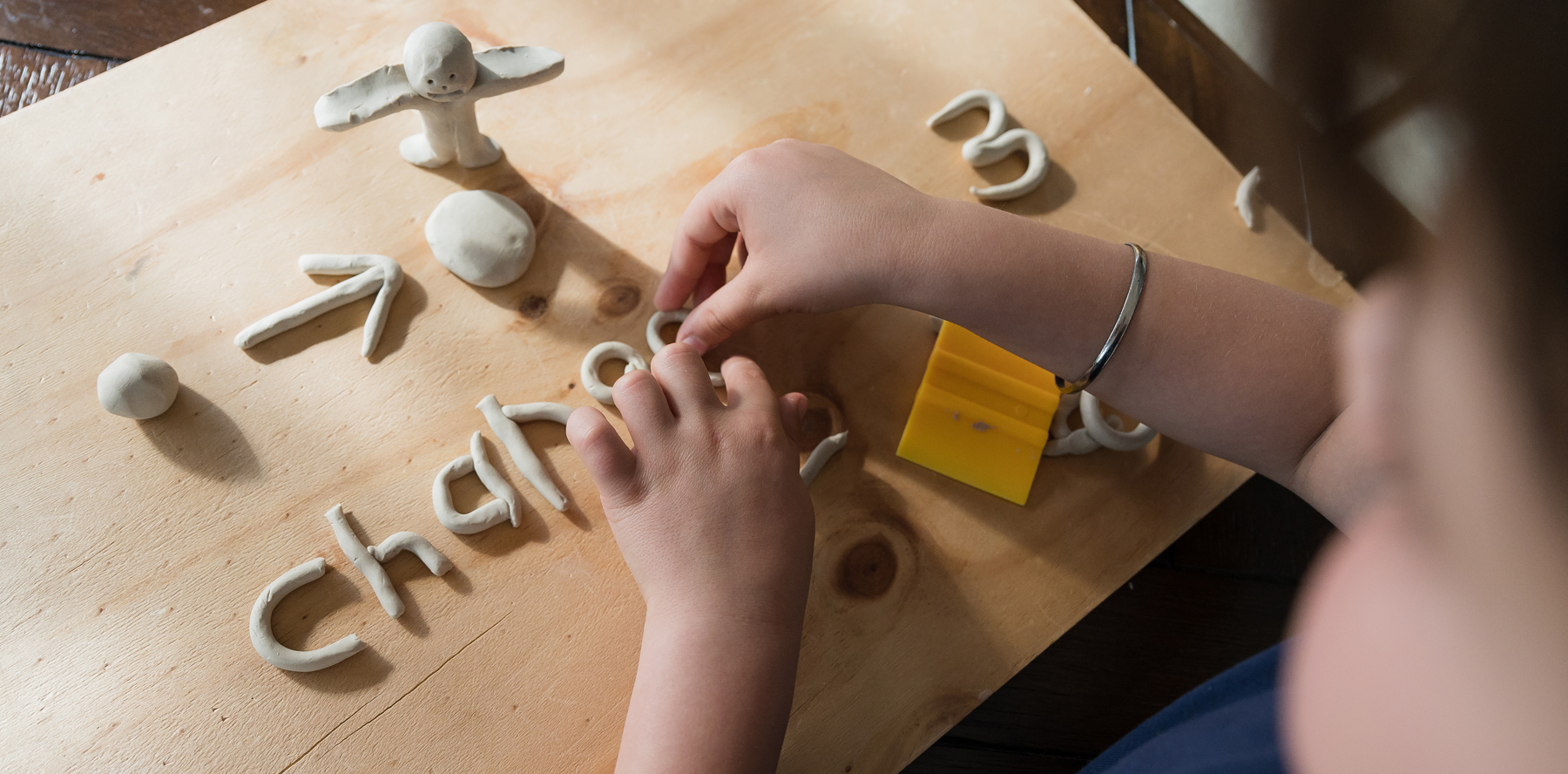

There are two generally accepted forms of thinking: verbal and non-verbal. People who develop learning difficulties such as dyslexia, dyscalculia, and ADHD – as well as autistic individuals – tend to think non-verbally, using mentally generated sensory impressions (“images”) that can be visual, tactile, kinesthetic, or auditory… They are imaginative, creative, empathetic, and often try to solve problems by looking at the whole picture, rather than working step-by-step.
This thinking style, combined with a higher-than-average responsiveness to physical, social and/or emotional sensory stimuli, has a direct impact on stress levels, behaviors, and the ability to learn and communicate. This is where the overlap with autism arises.
‘Different thinking’ calls for a different approach. Davis has developed strength-based techniques that harness the inherent gift of non-verbal thinking. This enables neurodivergent individuals everywhere to access their mental talents and successfully overcome virtually any resulting challenges.

Davis takes a practical, fun, and client-centered approach to help people understand the root cause of their own challenges and/or learning difficulties – and then upskill and adapt in a way that enables fast and impressive progress.
We use our insider understanding of the challenges and frustrations our clients are experiencing to provide proactive support and deliver simple interventions that spark incredible breakthroughs.

Once our clients recognize their inherent gift and the potential they can fulfill, they develop a renewed sense of self-esteem, capability and confidence. Then, when they start to use learning approaches that deliberately tap into and capitalize on their talents – the essence of the Davis method – progress is very rapid.
We know this, because we’ve seen it happen, time and time again, with priceless results.

Davis gives individuals tools and techniques to learn in a way that works for them.

At Davis, we celebrate different thinking. We delight in harnessing the extraordinary mental talents that enable easy and enjoyable learning and transformational achievements, all around the world. Could that include you too?
Imagine being free from the constant frustration, self-doubt, and uncertainty that accompany neurodivergence. Picture a life where challenges are conquered, leading to a sense of certainty and newfound confidence. With Davis, we don’t just acknowledge your struggles; we unlock the door to new possibilities, empowering you to thrive in a neurotypical world.
Explore solutions for yourself
Imagine the relief and joy of witnessing your child thrive emotionally, socially, and academically, with a bright future ahead. With Davis, you become a source of effective and meaningful support, fostering a positive learning environment at home so that your child’s light can shine.
Explore solutions to help your child
Imagine the fulfillment of employing proven teaching methods that cater to diverse learning styles, ensuring every student comprehends and excels. Experience the satisfaction of implementing strategies that proactively prevent the development of learning difficulties. With Davis, you become a catalyst for positive change, levelling the playing field and enabling every student to grow and succeed.
Explore solutions for teachers

Neurodivergent individuals often experience distortions in perception, but these problems are caused by mental disorientation. It’s not a problem with eyes or ears, but rather the way that the brain interprets the input from the sensory organs. Disorientation is often the source of many strengths and talents associated with neurodivergent thinking, e.g. creativity, innovative out-of-the-box thinking, empathy, creative problem-solving, etc.
Learning difficulties, including dyslexia, dyscalculia, and ADHD, arise from the way individuals process information and their tendency to disorientate in the face of confusion, overwhelm and over/under-stimulation. When disorientated, they will replace real sensory perceptions with mentally generated ones which they perceive as real, and this process distorts an accurate sense of sight, hearing, balance, movement, and time.
With the Davis method, students learn to recognize disorientation when it occurs, and apply simple techniques to reorient themselves – so they can maintain mental focus, accurately process information, and interact effectively with the physical environment without the need for external ‘crutches’.


Dyslexic students rely mostly on non-verbal thought processes. Since their primary mode of thought is to rely on pictures or other sensory impressions, they have difficulty thinking with the sounds of words – so it’s hard to try to read by breaking words down into component sounds.
Instead of trying to force students to use a method that’s inherently difficult for them, the Davis method teaches a visual and meaning-based approach that’s much easier for dyslexic individuals to learn and use. This, in turn, leads to much more rapid success. Rather than the slow progress and labored reading that’s often seen with phonics-based interventions, the Davis method enables dyslexic students to become fluent, capable, and often enthusiastic readers.
Neurodivergent individuals have a hard time remembering things they are not interested in or don’t fully understand. Repetition and drill are a waste of time and only serve to increase frustration, because they won’t retain information unless it connects with their understanding and how it fits into the ‘big picture’.
The Davis method is based on mastery – clients are given tools that enable them to master the symbols and concepts that are the foundations of learning and life. Once mastered, the information is understood inherently, and can be transferred across situations and experiences, eliminating the need for memorization through repetition or drill.

While some physical devices (such as fidget tools, technology, colored overlays, large print books, etc.) may seem to alleviate the impact of the difficulties, the use of such accommodations doesn’t help the individual address the root cause (disorientation) or to function without them in daily life.

The same applies to medication and attention difficulties. Individuals with ADHD also disorientate for longer periods of time, leading to a temporary shift away from reality and appearing to “have their head in the clouds.” Since neither dyslexia nor ADHD are a disease or a psychiatric ailment, medications will not address the underlying problem, and will only tend to hinder the individual’s ability to learn.
ADHD medication ‘works’ because it dulls and sometimes eliminates an individual’s ability to access their innate neurodivergent thinking talent (disorientation), thus putting them into a chemically induced oriented (focused) state. As with other accommodations, this does not foster understanding, skill, or independence. Davis understands the root cause, and so can help individuals understand and address it without the need for medication.
That said, even with meds, we can still help
Even if you are on medication for attention difficulties, and it is working for you, Davis methods can still help you. While the medication may help with attention focus, it will not help you with, for example, understanding time, or developing the ability to prioritize, or to recognize, establish and maintain order in your life, or even help you to take responsibility. The Davis Mastery for Attention and the Davis Concepts for Life programs will both help you address these challenges associated with attentional difficulties.

Any difficulty that neurodivergent individuals may have with friendships and relationships, are not due to lack of intelligence or socialization. Navigating successful relationships requires the mastery of cognitive concepts that can often be a little fuzzy – concepts such as cause and effect, time, order, emotion, motivation and responsibility.
The Davis method offers true mastery of these abstract cognitive concepts by making them concrete and easy to master. It allows the individual to think with these concepts and apply them to any given situation, giving them true autonomy in their life.

With every client, the Davis goal is to empower neurodivergent individuals to be in control of their own learning and life. The understanding and skills gained through Davis methods give them the ability to control disorientation at will. It also allows them to understand how they learn best and to be intentionally focused and productive when needed, while embracing their natural neurodivergent strengths and talents.
